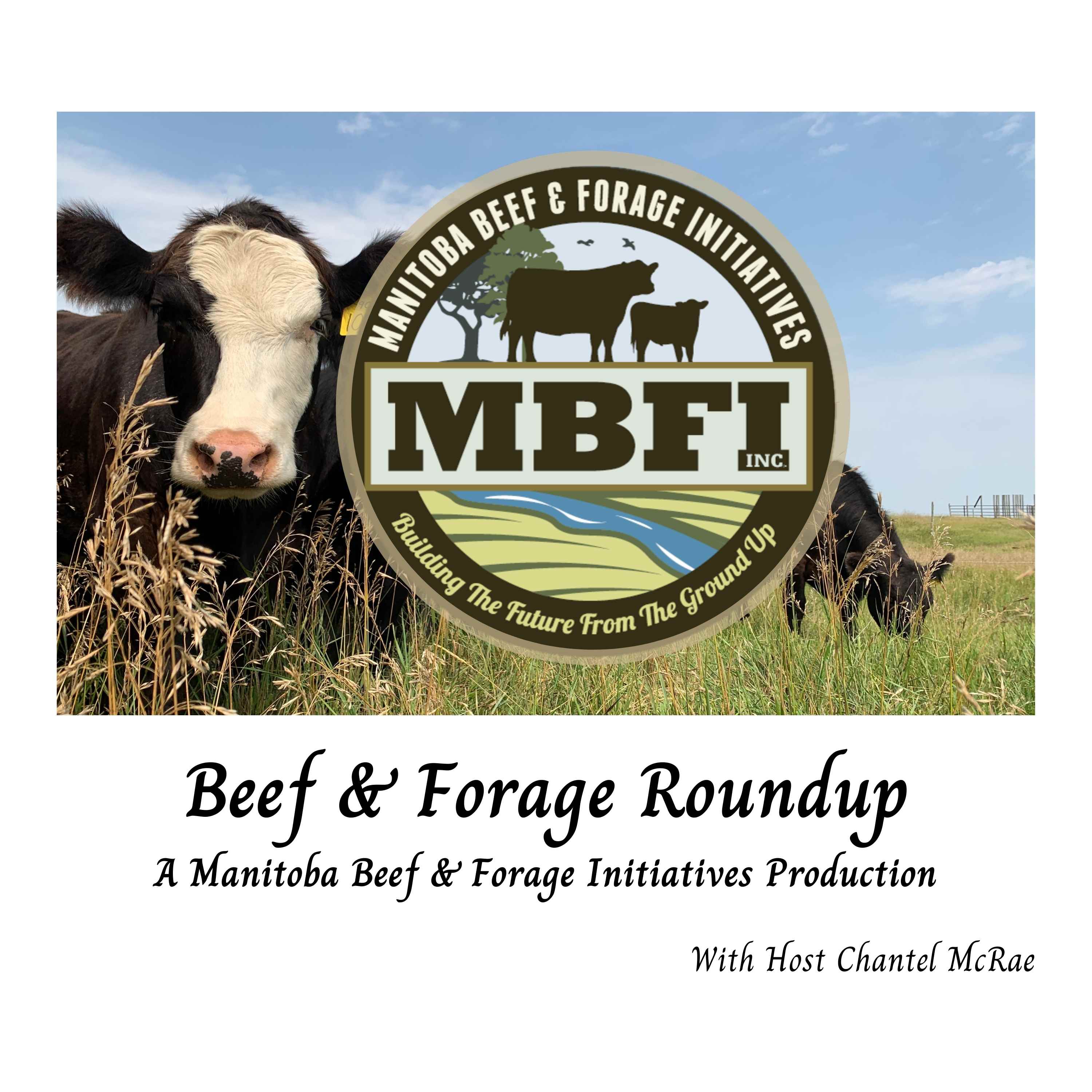Episode 30
Leafy Spurge Biocontrols with Mae Elsinger
Today we are talking with Mae Elsinger, who is a Rangeland Biologist with Agriculture and Agri-Food Canada. Since the start of Manitoba Beef & Forage Initiatives, Mae has been instrumental in lending her intellectual support for applied research and demonstration projects with a number of partners covering summer grazing strategies, pollinator habitat establishment, and leafy spurge biological control strategies. Mae also supports MBFI by serving as a committee member on our Research Advisory Committee.
We focus our discussion on Mae’s experience working with leafy spurge, covering how biocontrol measures can be used to reduce its presence. We also touch on a previously completed project led by Jane Thornton, now retired Manitoba Agriculture extension specialist, to train cattle to consume leafy spurge to improve pasture utilization.
Mae was raised on a subsistence farm in the bush in Northern Alberta, so she grew up with an appreciation of farming and knew she wanted to work outdoors. Mae trained at the University of Alberta in Environmental and Conservation Sciences. As part of that program, she focussed on Rangeland Management. She got her start with Rangeland Management as a student and then a full time biologist with the Prairie Farm Rehabilitation Administration (PFRA), a branch of Agriculture and Agri-Food Canada, working with the Community Pastures Program. That is where she first learned about leafy spurge, but also got first hand experience dealing with rotational grazing systems, brush and weed management, and other management challenges on large marginal pastures. At the closure of PFRA and the divestiture of Community Pastures about 10 years ago, her job changed to more of a research orientation, experimenting with different native and tame grasses and legumes and planting pollinator habitats, but more recently she has gotten back out on producers’ pastures collecting forage and grazing management information for the Living Laboratories Eastern Prairies Project. She lives in Brandon, Manitoba and experiments with gardening when not out and about exploring Manitoba’s multitude of hidden grasslands.
We start with outlining what Leafy Spurge is, where it is found in Manitoba and why it has such a negative impact on the landscape.
For this episode, we have used information and drawn questions from research on the following projects. The final reports for these studies are available at www.mbfi.ca
- 2015 - 2017 “Leafy Spurge Biological Control Agents” in collaboration with Bev Dunlop (AAFC) and Jane Thornton (MB Agriculture)
- 2016 - 2017 “Leafy Spurge and Cattle: teaching cattle to eat leafy spurge” in collaboration with Jane Thornton
- 2019 - 2021 “Understanding and manipulating leafy spurge population with cattle grazing and biological control agents”
- 2022 ongoing project “Exploring enhanced biocontrol techniques for controlling leafy spurge”
In the project information it references, “Leafy spurge infests at least 1.2 million acres in Manitoba and has a direct cost to the livestock industry of 10.2 million based on lost carrying capacity.” This is a huge cost and a big problem for producers in Manitoba.
Mae shares the most commonly applied control tactics and how well they work in the control and eradication of Leafy Spurge.
We talk about what the economic threshold is, or the amount of plants at which point cattle will reject grazing an area.
We move to a discussion on the use of biological controls or “biocontrols” for invasive weeds like leafy spurge, and what some of the biocontrols are that have been used in the past to reduce leafy spurge.
Mae shares information on the history and evolution of Leafy Spurge Flea Beetle releases and how this has evolved, as well as how spurge beetles assist in the reduction of leafy spurge and when they have the biggest impact.
In 2016, a project led by Jane Thornton started building on evaluation of the impact of grazing on spurge. The demonstration study looked at applying the Kathy Voth method, “Teach cattle to eat weeds program” to train cattle to consume leafy spurge despite having a strong aversion. We discuss how this training is carried out, as well as the outcomes of this training and the subsequent impacts cattle consumption had on the leafy spurge populations.
Mae shares many possible search topics for listeners to look up, if they are interested in more information. Further to this, you can always email information@mbfi.ca for more information.
The research programs and daily operations at MBFI would not be possible without the funding from the Province of Manitoba, Government of Canada, and Canadian Agricultural Partnership, as well as the partnership with Manitoba Agriculture, Manitoba Beef Producers (MBP), and Ducks Unlimited Canada (DUC).
We encourage you to follow MBFI on social media, or check out the website for more information on project findings and results, upcoming events and more!
Instagram: @MBBeefandForage
Facebook: @MBBeefandForage
Twitter: @MBBeefandForage
Website: www.mbfi.ca
Email address: information@mbfi.ca
Mary-Jane’s Phone Number: 431-255-0011
